Lent & Holy Week
 |
 |
 |
 |
 |
 |
 |
The Penitential Psalms - II
Supplication of the Sinner Punished by God
The third Penitential Psalm is Psalm 38, and it begins very characteristically with David asking for forgiveness. It starts like this:
“Rebuke me not, O Lord, in thy indignation; nor chastise me in thy wrath.”
Here King David gauges the immensity of the fury of Jehovah by the immensity of the sin that that he committed. Added to this are the aggravating factors of his sin, which give it a kind of double force, which is a horrible thing. So he asks God not to chastise him to that measure. Even as he acknowledges his guilt, he already begins to ask for mercy. The Psalm continues:
“For thy arrows are fastened in me: and thy hand hath been strong upon me.”
That is to say, God shoots arrows that pierce the unrepentant sinner. It is the hand of God that acted upon him, a tremendously heavy hand that crushes the poor creature.
And so he says: “I already feel the tremendous effect of those arrows and that hand. Do not destroy me, O my God, Thou Who hast already punished me. Do not let that destruction, which I know I merit, fall upon me." Then he gives an argument to convince God not to destroy him, for that is all that remains to be done to him:
“There is no health in my flesh because of thy wrath: there is no peace for my bones because of my sins.”
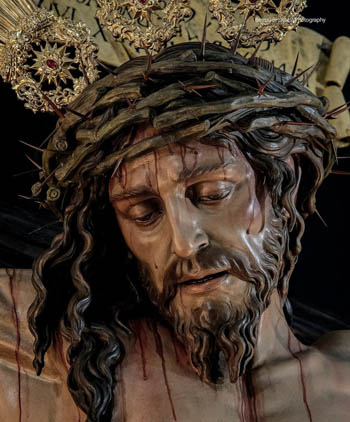 Note that this is a prophetic Psalm, which prophesizes the coming of Our Lord to men.
Note that this is a prophetic Psalm, which prophesizes the coming of Our Lord to men.
Consider Our Lord on the Cross: there is no soundness in His flesh and no peace in His bones because of the sins of men which He has taken upon Himself. David, as a penitent, was a prefigure of the Redeemer; David is expiating also for sins, although they were the sins committed by him. You can see the rich significance in this text.
It is beautiful to say that there is no peace in his bones. Peace is something moral, but here it refers to a body so deeply wounded that even its inner parts – the bones – are convulsed, so that even in its very depths there is no peace.
From this, you can see how the East is superior to the West. This is something that has a lyrical grandeur. What fabulous imponderables it evokes, which the modern man cannot understand!
It goes on to address the question of the reason why God gave him this punishment.
“For my iniquities are gone over my head: and as a heavy burden are become heavy upon me.”
“I have committed so many sins that the mountain of my sins hovers far above me and I am submerged in them; they rose over my head and inundated me.” And for this reason, upon this mountain that covers the sinner, the arrows of God fly, the hand of God comes, the flesh becomes a wound, the soul a lesion, the bones themselves are disturbed. That is to say, the soul is perturbed to its very depths.
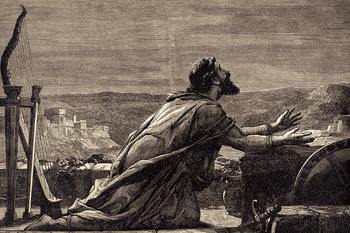 Can anyone paint a complete crisis in his soul more magnificently? I do not know of anyone who has described such a crisis with such superb expressions as these. Of course, we must make the effort to interpret these lines. They are not within the reach of everyone, but that is one more mark of this Psalm superiority.
Can anyone paint a complete crisis in his soul more magnificently? I do not know of anyone who has described such a crisis with such superb expressions as these. Of course, we must make the effort to interpret these lines. They are not within the reach of everyone, but that is one more mark of this Psalm superiority.
The effect of the sin he committed continues. He is punished; sin is like a mountain that weighs over him. Now the result:
“My sores are putrefied and corrupted, because of my foolishness.”
“Because of my lack of wisdom, these wounds in my soul have rotted and become corrupted. My whole body is, therefore, in a process of putrefication and the deterioration. I am not just hurt, I am infected, I am rotten. And why? Because of the sin that I have committed.” It is evident that what he says here about his body is a symbol of the state of his soul. The Psalm continues:
“I am become miserable, and am bowed down even to the end: I walked sorrowful all the day long.”
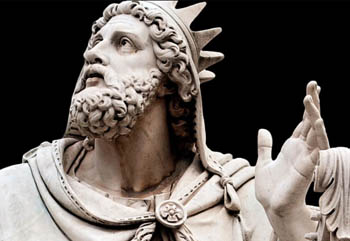 “This situation made me miserable. And I was overwhelmed, bending lower and lower to the ground. And this sorrow was with me the whole day, a sadness that never left me.”
“This situation made me miserable. And I was overwhelmed, bending lower and lower to the ground. And this sorrow was with me the whole day, a sadness that never left me.”
“For my loins are filled with illusions, and there is no soundness in my flesh.”
The illusions that spawned sin still exist in his soul, and these illusions are linked to its complete putrefaction. The root of sin, the cause of sin, is still within him; he still feels an attraction, the evil tendency to sin.
“I am afflicted and humbled exceedingly: I roared with the groaning of my heart. I am afflicted and greatly downcast; the groaning of my heart makes me roar.”
I find this expression very beautiful: my heart groans and I roar like a wounded lion in the face of this disgrace in which I find myself.
“Lord, all my desire is before thee, and my groaning is not hidden from thee.”
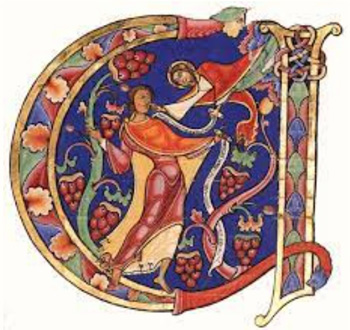 “You see, all my sins, O my God, but You also see that I have one thing: a desire. And this desire is a groan, and that groan is not hidden from You. My state does not please me, and something in me moves toward repentance.”
“You see, all my sins, O my God, but You also see that I have one thing: a desire. And this desire is a groan, and that groan is not hidden from You. My state does not please me, and something in me moves toward repentance.”
“My heart is troubled, my strength hath left me, and the light of my eyes itself is not with me.”
In this process of repentance, he states that his heart itself is shaken, his eyes are dying. I have the impression that this is an allusion to the death agony. I am not certain but there must be something like this in the death process, when the heart begins to falter and the vision fails.
“My friends and my neighbors have drawn near, and stood against me. And they that were near me stood afar off: And they that sought my soul used violence.”
Those who should defend me use violence against me. It is the punishment that fell on me.
“And they that sought evils to me spoke vain things, and studied deceits all the day long.”
It is the conspiracy that rose up against him like a whirlwind.
"But I, as a deaf man, heard not: and as a dumb man not opening his mouth."
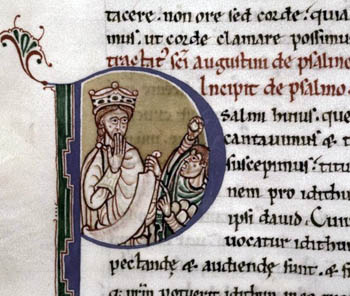 Again, it is Our Lord along the Via Sacra. He, like a deaf man, does not hear, and like a mute man, does not open his mouth. A beautiful meditation on the Passion could be made by reading these Psalms. Then David says:
Again, it is Our Lord along the Via Sacra. He, like a deaf man, does not hear, and like a mute man, does not open his mouth. A beautiful meditation on the Passion could be made by reading these Psalms. Then David says:
“And I became as a man that heareth not: and that hath no reproofs in his mouth.”
He is broken and mocked; he has no defense against what they say against him. It is yet another misery, he is completely perturbed and the whole world is against him.
“For in thee, O Lord, have I hoped: thou wilt hear me, O Lord my God.”
Here a type of victory of mercy in which enters something marvelous. He says to God: "Look, Lord, I have reached the end as a result of my many sufferings" – as if to say, “I know that You do not want to finish with me, and I confide in Your mercy behind all Your anger.”
Thus, while the consideration of justice goes as far as Heaven, it may be said that the consideration of mercy reaches the Heaven of Heavens. He has the certainty that, as he appears so prostrate and shattered, God will take pity on him and spare him the punishment that is about to fall. Thus he insists that God will hear him in his misery.
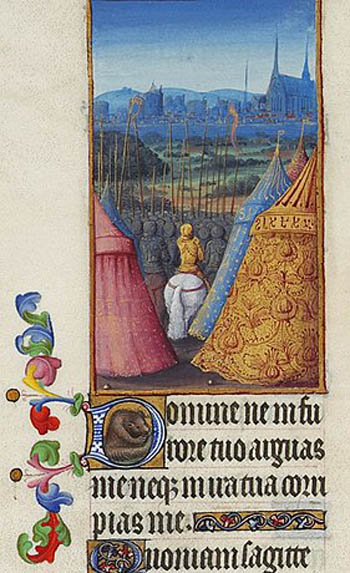 Here it becomes clear that the note of mercy surpasses the note of justice in this canticle, which is certainly neither the canticle of the Little Way nor the canticle of the new generation. But it cannot be denied that it has a beauty for all the centuries and is an admirable subject of meditation for all generations!
Here it becomes clear that the note of mercy surpasses the note of justice in this canticle, which is certainly neither the canticle of the Little Way nor the canticle of the new generation. But it cannot be denied that it has a beauty for all the centuries and is an admirable subject of meditation for all generations!
“For I said: Lest at any time my enemies triumph over me: and whilst my feet are moved, they speak great things against me.”
His enemies were worse than he was. They were God's enemies, while he was God's bad friend. Thus he believes that the enemies of God will not prevail. How fitting this thought is to apply to us and our defects!
“For I am ready for scourges: and my sorrow is continually before me.”
This is the reasons he trusts. Why did he say his enemies will never triumph over him? First, because he has hoped in God, he knows that God will hear him. This is confidence. Second: because his enemies, who are fighting against him, also fight against God. Because of the alliance he has with God, he knows that God will not forsake him. Third: because in his humility, he recognizes that he deserves the punishment. “And my pain is always before me.” He has not a moment of forgetfulness; on the contrary, he is continually penitent, his sin continually grieves him.
“For I will declare my iniquity: and I will think for my sin.”
Here he asserts that he will not just repent of his sin now, but will continue to always do so.
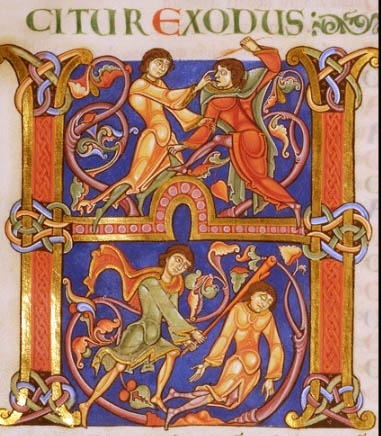 “But my enemies live, and are stronger than I: and they that hate me wrongfully are multiplied.”
“But my enemies live, and are stronger than I: and they that hate me wrongfully are multiplied.”
"I am so humiliated, and the scoundrel is so glorified! Do you, my God, not see this? I am certain that you do!" These are the reasons for his confidence. Then comes another expression that clearly indicates his link with God and the link of his adversaries with the Devil:
“They that render evil for good have detracted me, because I followed goodness.”
There were people who did not like him because he was a son of light, and when they saw him sin, they mocked him.
The conclusion of the Psalm:
“Forsake me not, O Lord my God: do not thou depart from me. Attend unto my help, O Lord, the God of my salvation.”
And with these words “of my salvation,” he ends his Psalm with words that show a complete confidence.
To be continued

“Rebuke me not, O Lord, in thy indignation; nor chastise me in thy wrath.”
Here King David gauges the immensity of the fury of Jehovah by the immensity of the sin that that he committed. Added to this are the aggravating factors of his sin, which give it a kind of double force, which is a horrible thing. So he asks God not to chastise him to that measure. Even as he acknowledges his guilt, he already begins to ask for mercy. The Psalm continues:
“For thy arrows are fastened in me: and thy hand hath been strong upon me.”
That is to say, God shoots arrows that pierce the unrepentant sinner. It is the hand of God that acted upon him, a tremendously heavy hand that crushes the poor creature.
And so he says: “I already feel the tremendous effect of those arrows and that hand. Do not destroy me, O my God, Thou Who hast already punished me. Do not let that destruction, which I know I merit, fall upon me." Then he gives an argument to convince God not to destroy him, for that is all that remains to be done to him:
“There is no health in my flesh because of thy wrath: there is no peace for my bones because of my sins.”

He prophetically predicts Christ’s agony on the Cross
Consider Our Lord on the Cross: there is no soundness in His flesh and no peace in His bones because of the sins of men which He has taken upon Himself. David, as a penitent, was a prefigure of the Redeemer; David is expiating also for sins, although they were the sins committed by him. You can see the rich significance in this text.
It is beautiful to say that there is no peace in his bones. Peace is something moral, but here it refers to a body so deeply wounded that even its inner parts – the bones – are convulsed, so that even in its very depths there is no peace.
From this, you can see how the East is superior to the West. This is something that has a lyrical grandeur. What fabulous imponderables it evokes, which the modern man cannot understand!
It goes on to address the question of the reason why God gave him this punishment.
“For my iniquities are gone over my head: and as a heavy burden are become heavy upon me.”
“I have committed so many sins that the mountain of my sins hovers far above me and I am submerged in them; they rose over my head and inundated me.” And for this reason, upon this mountain that covers the sinner, the arrows of God fly, the hand of God comes, the flesh becomes a wound, the soul a lesion, the bones themselves are disturbed. That is to say, the soul is perturbed to its very depths.

King David, broken & pleading for mercy
The effect of the sin he committed continues. He is punished; sin is like a mountain that weighs over him. Now the result:
“My sores are putrefied and corrupted, because of my foolishness.”
“Because of my lack of wisdom, these wounds in my soul have rotted and become corrupted. My whole body is, therefore, in a process of putrefication and the deterioration. I am not just hurt, I am infected, I am rotten. And why? Because of the sin that I have committed.” It is evident that what he says here about his body is a symbol of the state of his soul. The Psalm continues:
“I am become miserable, and am bowed down even to the end: I walked sorrowful all the day long.”

He acknowledges illusions that still exist in his soul
“For my loins are filled with illusions, and there is no soundness in my flesh.”
The illusions that spawned sin still exist in his soul, and these illusions are linked to its complete putrefaction. The root of sin, the cause of sin, is still within him; he still feels an attraction, the evil tendency to sin.
“I am afflicted and humbled exceedingly: I roared with the groaning of my heart. I am afflicted and greatly downcast; the groaning of my heart makes me roar.”
I find this expression very beautiful: my heart groans and I roar like a wounded lion in the face of this disgrace in which I find myself.
“Lord, all my desire is before thee, and my groaning is not hidden from thee.”

Another prefigure of Our Lord
asking for mercy in the Garden
“My heart is troubled, my strength hath left me, and the light of my eyes itself is not with me.”
In this process of repentance, he states that his heart itself is shaken, his eyes are dying. I have the impression that this is an allusion to the death agony. I am not certain but there must be something like this in the death process, when the heart begins to falter and the vision fails.
“My friends and my neighbors have drawn near, and stood against me. And they that were near me stood afar off: And they that sought my soul used violence.”
Those who should defend me use violence against me. It is the punishment that fell on me.
“And they that sought evils to me spoke vain things, and studied deceits all the day long.”
It is the conspiracy that rose up against him like a whirlwind.
"But I, as a deaf man, heard not: and as a dumb man not opening his mouth."

The great King made deaf & dumb by his misery
“And I became as a man that heareth not: and that hath no reproofs in his mouth.”
He is broken and mocked; he has no defense against what they say against him. It is yet another misery, he is completely perturbed and the whole world is against him.
“For in thee, O Lord, have I hoped: thou wilt hear me, O Lord my God.”
Here a type of victory of mercy in which enters something marvelous. He says to God: "Look, Lord, I have reached the end as a result of my many sufferings" – as if to say, “I know that You do not want to finish with me, and I confide in Your mercy behind all Your anger.”
Thus, while the consideration of justice goes as far as Heaven, it may be said that the consideration of mercy reaches the Heaven of Heavens. He has the certainty that, as he appears so prostrate and shattered, God will take pity on him and spare him the punishment that is about to fall. Thus he insists that God will hear him in his misery.

‘Do not let my enemies triumph over me’
“For I said: Lest at any time my enemies triumph over me: and whilst my feet are moved, they speak great things against me.”
His enemies were worse than he was. They were God's enemies, while he was God's bad friend. Thus he believes that the enemies of God will not prevail. How fitting this thought is to apply to us and our defects!
“For I am ready for scourges: and my sorrow is continually before me.”
This is the reasons he trusts. Why did he say his enemies will never triumph over him? First, because he has hoped in God, he knows that God will hear him. This is confidence. Second: because his enemies, who are fighting against him, also fight against God. Because of the alliance he has with God, he knows that God will not forsake him. Third: because in his humility, he recognizes that he deserves the punishment. “And my pain is always before me.” He has not a moment of forgetfulness; on the contrary, he is continually penitent, his sin continually grieves him.
“For I will declare my iniquity: and I will think for my sin.”
Here he asserts that he will not just repent of his sin now, but will continue to always do so.

‘Let me rise up over my enemy for Thy glory’
"I am so humiliated, and the scoundrel is so glorified! Do you, my God, not see this? I am certain that you do!" These are the reasons for his confidence. Then comes another expression that clearly indicates his link with God and the link of his adversaries with the Devil:
“They that render evil for good have detracted me, because I followed goodness.”
There were people who did not like him because he was a son of light, and when they saw him sin, they mocked him.
The conclusion of the Psalm:
“Forsake me not, O Lord my God: do not thou depart from me. Attend unto my help, O Lord, the God of my salvation.”
And with these words “of my salvation,” he ends his Psalm with words that show a complete confidence.
To be continued

Posted April 3, 2023












